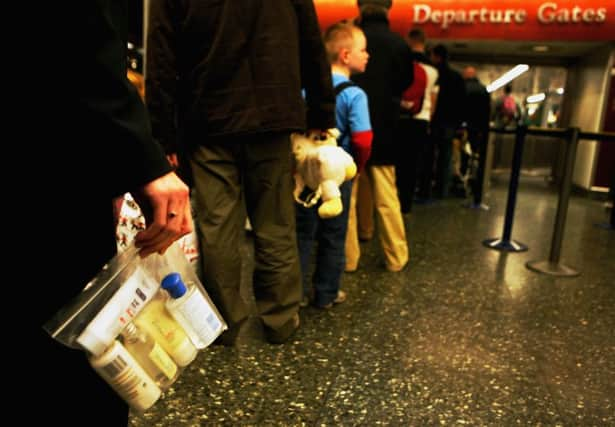Air passengers still falling foul of liquids curb


Dozens of binfuls of oversize bottles are collected every day, the country’s two busiest terminals have revealed.
Airport officials are anxious to reduce the number to minimise delays for passengers passing through security, as they approach their most hectic period of the year – the start of the school holidays in two weeks’ time.
Advertisement
Hide AdAdvertisement
Hide AdEdinburgh, Scotland’s busiest airport with one million passengers a month, is already struggling with massive queues for security at certain times of the day.
Passengers were limited to carrying liquids in their hand luggage in bottles of up to 100ml in 2006 after a terrorist plot to blow up several aircraft was foiled.
The bottles must also fit into a transparent, resealable plastic bag measuring 20cm by 20cm. Larger bottles, even if only partially full, must be carried in checked-in luggage.
Months after the restrictions were imposed, nearly 1,000 bottles a day were being collected at Edinburgh, Glasgow and Aberdeen airports.
However, nine years on, the situation seems to have hardly improved. Edinburgh said the 18 bins in its security hall had to be emptied at least three times a day.
Last week, passengers complained about queues to enter the new security area, which has suffered teething troubles for months, snaking 100 metres back through the terminal, even at 6am.
Jim Brydon, the strategy director of an Edinburgh-based financial services firm, described it as “an absolute shambles”.
He said: “I experienced exactly the same at mid-afternoon a couple of weeks ago, so it is not just an early morning problem. When the holiday season fully kicks in it will be a nightmare.”
Advertisement
Hide AdAdvertisement
Hide AdAirport chief executive Gordon Dewar said: “It’s going to be a very busy summer for us. We want to make sure our passengers have a good experience and are encouraging everyone to be prepared.
“This is so important as it inevitably impacts the length of time it’ll take to pass through the system.
“We know that over the last few months, passengers have had to queue for longer than we’d like to get through security.
“The whole airport, including our airline partners, are focused on fixing this issue and their support has been phenomenal. With the school holidays just around the corner, we’re calling on everyone travelling to be ready for security.
“You can do this easily and save time by ensuring all liquids, gels and pastes are 100ml or less and are presented in a clear plastic bag, outside hand luggage. If passengers want to take larger bottles then these should be checked in with hold luggage.”
A Glasgow Airport spokeswoman said: “There are still lots and lots of people coming through with bottles too big.
“It does not seem to be getting any better.”
The apparent lack of progress has come despite the airport revamping its security area with tables for passengers to take bottles out of their bags because they have to be put through X-ray machines separately.
A “virtual assistant” on a TV screen also reminds travellers about the restrictions as they enter the area.
Advertisement
Hide AdAdvertisement
Hide AdGlasgow Airport said it was having to empty security area bins five times a day, each containing 100 or more bottles.
Its spokeswoman said: “Passengers should ensure they come to the airport ready to travel to help reduce the time it takes to get through security.
“We still see a high volume of passengers arriving at the airport with liquids over 100ml in their hand luggage, and the bins at our disposal points are emptied by our cleaning team at least five times each day.”
The Civil Aviation Authority said it measured passenger compliance with regulations but did not publish the figures.